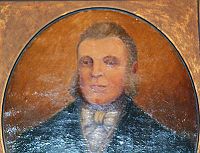- Country Party (Rhode Island)
-
The Country Party, Rhode Island's anti-federalist political party, controlled the Rhode Island General Assembly from 1786 and 1790 and opposed the Federalist Party, which supported the U.S. Constitution. The Federalists were largely from the "town," Providence, Rhode Island, while the Country Party members were from the surrounding rural areas. The Country Party opposed the U.S. Constitution largely because of civil liberties concerns (support for the Bill of Rights), distrust of distant government, opposition to slavery in the Constitution, and disagreements about monetary policy (honoring paper currency as legal tender).
Contents
Control of the General Assembly
Although Rhode Island passed legislation asserting its independence from Great Britain prior to the Declaration of Independence in 1776, it remained the last of the thirteen colonies to ratify the U.S. Constitution. Rhode Island's movement for state independence lasted long after the passage of the Constitution in 1788. Scituate's William West and South Kingstown's Jonathan Hazard were leaders of the rural party. The Country Party "was suspicious of the power and the cost of a government too far removed from the grass-roots level, and so it declined to dispatch delegates to the Philadelphia Convention of 1787, which drafted the United States Constitution. Then, when that document was presented to the states for ratification, Hazard's faction delayed (and nearly prevented) Rhode Island's approval."[1]
Rhode Island Quakers were opposed to the Constitution largely because of its sanctioning of slavery. Some Rhode Islanders were also concerned about the Constitution for libertarian reasons and wanted a Bill of Rights to protect individual liberties, particularly Baptists (one of the largest denominations in Rhode Island) who had historically been persecuted by central governments. In the rural areas of Rhode Island, citizens wanted to ensure that their paper currency was redeemable as legal tender in the future.
William West's protest
William West led nearly 1,000 armed, rural farmers to Providence to protest an ox roast celebration and toast to the Constitution on the 4th of July in 1788 (shortly after the ninth state had ratified it). A compromise between the federalists and anti-federalists was reached, and civil war was averted (the federalists agreed to celebrate only independence and not the adoption of the Constitution). The incident was largely reported in newspapers throughout the thirteen colonies. Resistance to the Constitution, however, remained strong, and Rhode Island was the last of the 13 colonies to ratify the Constitution in 1790.[2]
Passage of the U.S. Constitution
After delaying a constitutional convention eleven times, the legislature finally called for a convention in South Kingstown (Kingston) in March of 1790. After failing to reach a majority, another convention was held in Newport in May of 1790 where the Constitution narrowly passed after several antifederalists absented themselves and Governor John Collins decided to support the Constitution (costing him his office). Rhode Island was the last of the original 13 states to ratify the Constitution in 1790 and ratified it by the narrowest margin of any state (34-32) .
Aftermath
In retaliation for Collins' switch to support the Constitution, Rhode Islanders elected anti-federalist, Arthur Fenner, governor for the next 15 years. After passage of the Constitution, some Country Party leaders such as William West were left bankrupt because the federal government refused to honor the state's paper money as legal tender. Also, largely because of Rhode Island and North Carolina's libertarian objections, a Bill of Rights passed in 1791.
References and external links
Rhode Island political parties Major 
Minor Defunct Law and Order · Country PartyCategories:- Political parties established in 1786
- Political parties disestablished in 1790
- Defunct political parties in the United States
- History of Rhode Island
- Politics of Rhode Island
- Anti-Federalists
Wikimedia Foundation. 2010.


